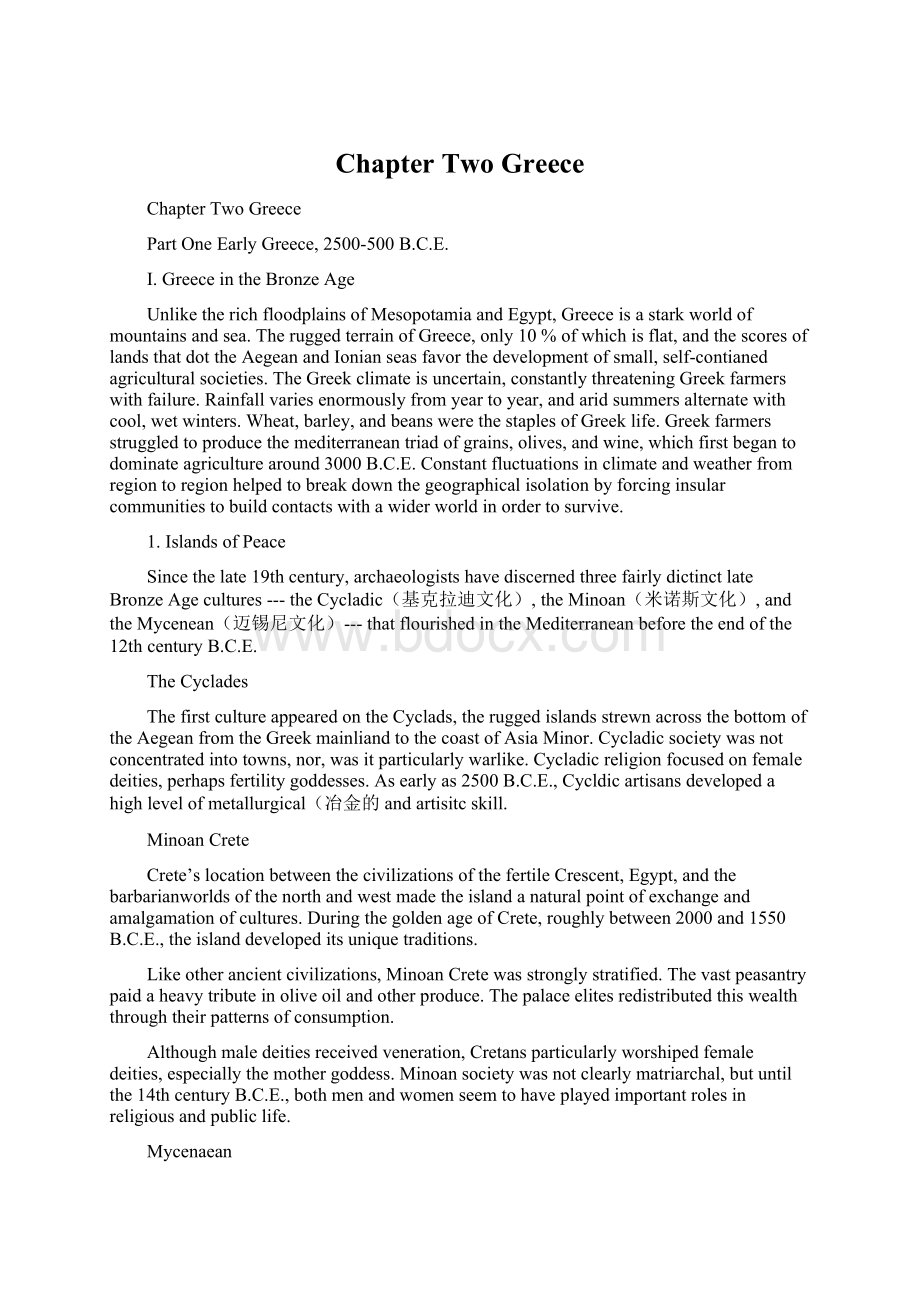Chapter Two Greece.docx
《Chapter Two Greece.docx》由会员分享,可在线阅读,更多相关《Chapter Two Greece.docx(22页珍藏版)》请在冰豆网上搜索。

ChapterTwoGreece
ChapterTwoGreece
PartOneEarlyGreece,2500-500B.C.E.
I.GreeceintheBronzeAge
UnliketherichfloodplainsofMesopotamiaandEgypt,Greeceisastarkworldofmountainsandsea.TheruggedterrainofGreece,only10%ofwhichisflat,andthescoresoflandsthatdottheAegeanandIonianseasfavorthedevelopmentofsmall,self-contianedagriculturalsocieties.TheGreekclimateisuncertain,constantlythreateningGreekfarmerswithfailure.Rainfallvariesenormouslyfromyeartoyear,andaridsummersalternatewithcool,wetwinters.Wheat,barley,andbeanswerethestaplesofGreeklife.Greekfarmersstruggledtoproducethemediterraneantriadofgrains,olives,andwine,whichfirstbegantodominateagriculturearound3000B.C.E.Constantfluctuationsinclimateandweatherfromregiontoregionhelpedtobreakdownthegeographicalisolationbyforcinginsularcommunitiestobuildcontactswithawiderworldinordertosurvive.
1.IslandsofPeace
Sincethelate19thcentury,archaeologistshavediscernedthreefairlydictinctlateBronzeAgecultures---theCycladic(基克拉迪文化),theMinoan(米诺斯文化),andtheMycenean(迈锡尼文化)---thatflourishedintheMediterraneanbeforetheendofthe12thcenturyB.C.E.
TheCyclades
ThefirstcultureappearedontheCyclads,theruggedislandsstrewnacrossthebottomoftheAegeanfromtheGreekmainliandtothecoastofAsiaMinor.Cycladicsocietywasnotconcentratedintotowns,nor,wasitparticularlywarlike.Cycladicreligionfocusedonfemaledeities,perhapsfertilitygoddesses.Asearlyas2500B.C.E.,Cycldicartisansdevelopedahighlevelofmetallurgical(冶金的andartisitcskill.
MinoanCrete
Crete’slocationbetweenthecivilizationsofthefertileCrescent,Egypt,andthebarbarianworldsofthenorthandwestmadetheislandanaturalpointofexchangeandamalgamationofcultures.DuringthegoldenageofCrete,roughlybetween2000and1550B.C.E.,theislanddevelopeditsuniquetraditions.
Likeotherancientcivilizations,MinoanCretewasstronglystratified.Thevastpeasantrypaidaheavytributeinoliveoilandotherproduce.Thepalaceelitesredistributedthiswealththroughtheirpatternsofconsumption.
Althoughmaledeitiesreceivedveneration,Cretansparticularlyworshipedfemaledeities,especiallythemothergoddess.Minoansocietywasnotclearlymatriarchal,butuntilthe14thcenturyB.C.E.,bothmenandwomenseemtohaveplayedimportantrolesinreligiousandpubliclife.
Mycenaean
Around1600B.C.E.,anewandpowerfulwarriorcivilizationaroseonthePeloponnesusatMycenae.Thiscivilization,whichencompassednotonlytheGreekmainlandbutalsopartsofthecoastofAsiaMinor,iscalledMycenaean,althoughthereisnoevidencethatthecityofMycenaeactuallyruledallGreece.
TheMycenaeansquicklyadoptedartisanalandarchitecturaltechniquesfromneighboringcultures,especiallyfromtheHittitesandfromCrete,andincorporatedthesetechniquesintoadistinctivetraditionoftheirown.
2.TheDarkAge
Mycenaeandominationdidnotlastforlong.Around1200B.C.E.,manyofthemainlandandislandfortressesandcitiesweresackedandtotallydestroyed.Whyandhowthishappenedareamongthegreatmysteriesofworldhistory.Inlatercenturies,theGreeksbelievedthataftertheTrojianWar,newpeoples,especiallytheDorians,hadmigratedintoGreece,destroyingMycenaeandmostoftheotherAchaean(亚加亚人的;希腊的)cities.Morerecently,somehistorianshavearguedthatcatastrophicclimatechanges,volcaniceruptions,orsomeothernaturaldisasterwreckedthecitiesandbroughtfamineandtremendoussocialunrestinitswake.
Neithertheoryisaccurate.MycenaeanGreeceself-destructed.ItsdisintegrationwaspartofthewidespreadcrisisaffectingtheeasternMediterraneaninthe12thcenturyB.C.E.Overpopulation,thefragilityoftheagrarianbase,therisksofoverspecializationincashcropssuchasgraininMesseniaandsheepraisinginCrete,andrivalryamongstates---allmadeMycenaeanculturevulnerable.ThedisintegrationoftheHittiteempireandthenear-collapseoftheEgyptianempiredisruptedMediterraneancommerce,exacerbatinghostilitiesamongGreekstates.
Fromroughly1200to800B.C.E.,theAegeanworldenteredwhatisgenerallytermedtheDarkAge,aconfusedperiodaboutwhichlittleisknown,duringwhichGreecereturnedtoamoreprimitivelevelofcultureandsociety.
InthewakeoftheMycenaeancallopse,bandsofnorthernersmovedslowlyintothePeloponnesuswhileotherGreeksmigratedoutfromthemainlandtotheislandsandthecoastofAsiaMinor,bringingdistinctivedialecticandculturalcharateristics.Asaresult,fromthe11thcentureB.C.E.,bothshoresoftheAegeanbecamepartofaGreek-speakingworld.Stilllater,GreeksestablishedcoloniesinwhatistodaysouthernUkraine,Italy,NorthAfrica,Spain,andFrance.Throughoutitshistory,Greecewaslessageographicalthanaculturaldesignation.
TheGreeceofthisDarkAgewasmuchpoorer,morerural,andmoresimplyorganized.Architectureandurbantraditionsdeclined,andwritingdisappearedalongwiththeelitesforwhoseexclusivebenfittheseachievementshadserved.
Gradually,beginninginthe11thcenturyB.C.E.,thingsbegantochangeabit.Forinstance,Greeksinsomelocationsstoppedburyingtheirdeadandbegantopracticecremation.
Thetwoepicpoems,theIliadandtheOdyssey,traditionallyascribedtoHomer,wereactuallytheworkoforalbards(吟游诗人)orperformerswhocomposedastheychanted.Muchofthedescriptionoflife,society,andcultureinHomericpoemsactuallyreflectsDarkAgeconditions.
FromtheBronzeAgecivilization,speakersofGreekhadinheriteddistantmemoriesofanoriginal,highlyorganizedurbancivilizationgraftedontotherural,aristocraticwarriorsocietyoftheDarkAge.Mostimportant,thiscommondimlyrecollectedpastgaveallGreek-speakinginhabitantsoftheMediterraneanworldcommonmyths,values,andidentity.
II.ArchaicGreece,700-500B.C.E.
Betweenroughly800and500B.C.E.,extraordinarychangestookplaceintheGreekworld.ThedescendantsofthefarmersandherdsmenofHomer’sDarkAgebroughtaboutarevolutioninpoliticalorganization,artistictraditions,intellectualvalues,andsocialstructures.Inaburstofcreativityforgedinconflictandcompetition,theyinventedpolitics,abstractthought,andtheindividual.GreeksoftheArchaicAgesettheagendafortherestofWesternhistory.
1.Changes
ThefirstsignofradicalchangeinGreecewasthemajorincreaseinpopulationinthe8thcenturyB.C.E.Itsconsequenceswereenormous.
First,populationincreasemeantmorevillagesandtowns,greatercommunicationamongthem,andthusthemorerapidcirculationofideasandskills.
Second,therisingpopulationplacedimpossibledemandsontheaagriculturalsystemofmuchofGreece.
Third,itledtogreaterdivisionoflaborand,withanincreasinglydiversepopulation,tofundamentalchangesinpoliticalsystem.
ThesecondchangewasthatthemultiplicityofpoliticalandsocialformsdevelopingintheArchaicAgesettheframeworkwithinwhichthefirstfloweringofGreekculturedeveloped.
Thethirdchangewasthateconomicandpoliticaltransformationlaidbasisforintellectualadvancebycreatingabroadclasswiththeprosperitytoenjoysufficientleisureforthoughtandcreativeactivity.
Finally,maritimerelationsbroughtpeopleandideasfromaroundtheGreekworldtogether,cross-fertilizing(相互影响)artistsandintellectualsinawayneverbeforeseenintheWest.
2.EthnosandPolis
Ingeneral,twoformsofpoliticalorganizationdevelopedinresponsetothepopulationexplosionofthe8thcenturyB.C.E.
OnthemainlandandinmuchofthewesternPeloponnesus,peoplecontinuedtoliveinlargeterritorialunitscalledethne(sing.Ethnos).Ineachethnos,peoplelivedinvillagesandsmalltownsscatteredacrossawideregion.Theethnoswasgovernedbyanelite,oroligarchy,madeupofmajorlandownerswhometfromtimetotimeinoneoranothertownwithintheregion.Thisformofgovernment,whichhaditsrootsintheDarkAge,continuedtoexistthroughouttheclassicalperiod.
Amuchmoreinnvativeformofpoliticalorganization,whichdevelopedontheshoresoftheAegeanandontheislands,wasthepolis(pl.poleis),orcity-state.Initially,polismeant“citadel”.Villagesclusteredaroundthesefortifications,whichwerebothprotectivestructuresandcultcentersforspecificdeities.Inadditiontoprotection,thepolisofferedamarketplace,wherefarmersandartisanscouldtradeandconductbusiness.Therapidpopulationgrowthofthe8thcenturyB.C.E.ledtothefusionofthesevillagesandtheformationofrealtowns.Eachtownwasindependent,andwasruledbyamonarchyoranoligarchy.Eachtowncontrolledthesurroundingregion.Attimesofpoliticalormilitarycrisis,therulersmightsummonanassemblyofthefreemalesofthecommunitytotheagoratoparticipateinortowitnessthedecision-makingprocess.Inthefollowingcenturiesthesecity-statesbecamethecenterforthatmostdramaticGreekexperimentingovernment:
democracy.
3.WritingandWarfare
Sometimeinthe8thcenturyB.C.E.,GreeksadoptedthePhoenician(腓尼基人)writingsysytem.Fromthestart,thiswritingsystemwasintendedforprivate,personaluseandwasavailabletovirtuallyanyone.
Thedemocratizationofwarledtothedemocratizationofpoliticallife.Thosewhobroughtvictoryinthephalanx(pl.phalanxesorphalanges)wereunwillingtoaccepttotaldominationbythearistocracyintheagora.Therapidgrowthoftheurbanpopulation,theincreasingimpoverishmentoftheruralpeasantry,andtheriseofanewclassofwealthymerchantcommonerswereallchallengesthat